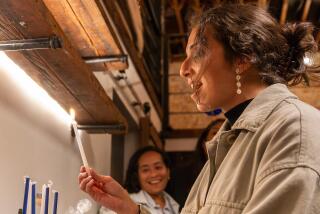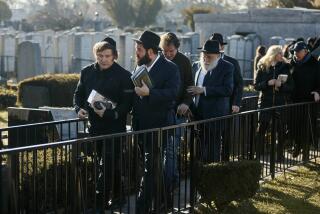Wording in Spanish-Language Bible Draws Jewish Complaints
- Share via
BUENOS AIRES — Latin America’s history of religious persecution has left Jewish groups alert not just for intolerance but also its echoes. Now a conflict that could reopen old wounds has arisen here, one concerning the Bible: not the text itself but the footnotes.
The dispute over a Spanish-language edition is a reminder that relations between the faiths can be painfully sensitive. The way in which Jewish and Roman Catholic leaders have come together to discuss the problem, however, reflects a spirit of rapprochement frequently urged by Pope John Paul II.
The version of the Bible under scrutiny was edited by Bernard Hurault, a French priest who served in Latin America. Published in Spain, the edition has sold at least 34 million copies and is aimed at working-class Catholics in the Southern Hemisphere, as well as Spanish speakers in the United States.
But 19 references to Jews and Judaism in the explanatory footnotes caught the attention of the Los Angeles-based Simon Wiesenthal Center, an international organization dedicated to fighting bigotry and preserving the memory of the Holocaust. Representatives of the center asked Catholic leaders in Argentina and Chile this week to address their concerns about those editorial comments.
The complaint has a precedent. A court in Paris ruled in 1995 that the French edition by the same author contained two anti-Semitic references, and it ordered them expurgated, though the court declined to eliminate other passages that were challenged. French church officials then withdrew their imprimatur of the edition.
In the Latin American version, footnotes refer to Jews as “a very ignorant people,” “sinners” and scornful of other religions. One note states that “the judgment of God has not yet fallen on the Jewish people.”
“I’m not saying it was done with malicious, anti-Semitic intent, but it reflects an old-fashioned mentality,” said Shimon Samuels, the Paris-based director of international liaison activities for the Wiesenthal Center. “This kind of language is out of place today.”
It is not necessary to go back to the Inquisition to find examples of officially sanctioned anti-Semitism in Latin America.
Catholic clergy on both sides of the Atlantic helped Nazi war criminals find refuge in South America. Later, the anti-Jewish diatribes of Julio Meinvielle, an influential Argentine priest, set the ideological tone for the “dirty war” waged against dissidents by the 1976-1983 dictatorship. During the 1990s, terrorist bombings destroyed a Jewish community center and the Israeli Embassy in Buenos Aires, leaving a total of 115 dead.
Anti-Semitic comments and incidents still crop up from Chile to Venezuela. Add to that backdrop today’s Middle East tensions, and the allegedly negative sentiments in the edition of the Bible could foment bias, according to Samuels.
Recalling the longtime depiction of “the Jew as antichrist,” Samuels said: “I don’t know what a peasant thinks when he reads this Bible. He’s being served a dish of old-fashioned prejudice against people he never met.”
In meetings with church officials this week at a human rights conference in Santiago, Chile, Samuels bolstered his argument with a scholarly analysis commissioned by Colombian bishops.
The descriptions of Judaism are unusual compared with other editions of the Bible, concluded the Rev. Hugo Fernandez Mora of Colombia’s Episcopal Council in a letter summarizing the findings. “Above all, it is jarring the manner in which at many times it discusses ‘the Jews’ in a general and even anachronistic way.”
Others, however, caution that context is important.
“Some of it may be interpretable,” said the Rev. Eduardo Perez, an Argentine Catholic priest. “The part about ‘an ignorant people’ may be because in the text [the speaker] is addressing a village of peasants. This has to be reviewed by an expert on the Bible.”
In response to the Wiesenthal Center’s concerns, Catholic officials in Argentina commissioned their own study of a CD-ROM version of the edition produced in the country, Perez said. The confidential results have been sent to the Chilean archdiocese that provided an imprimatur of the edition, he said.
The Madrid publishers have promised to make changes. And Samuels has requested that the Vatican issue a statement, to be published in new editions, that explains why the material was removed.
More to Read
Sign up for Essential California
The most important California stories and recommendations in your inbox every morning.
You may occasionally receive promotional content from the Los Angeles Times.













